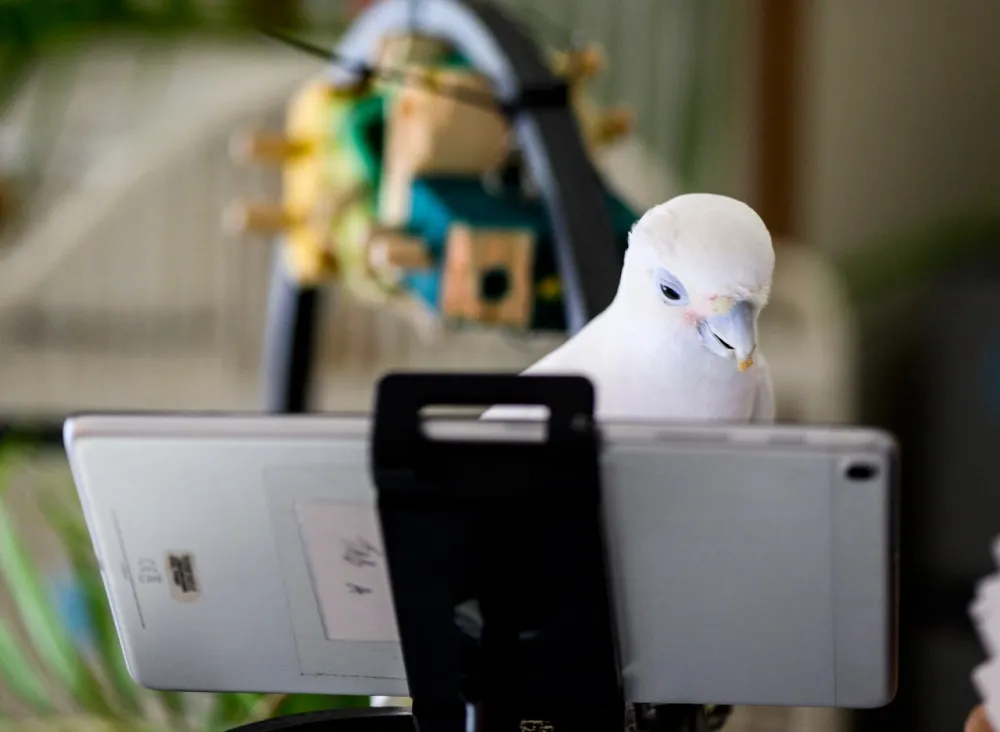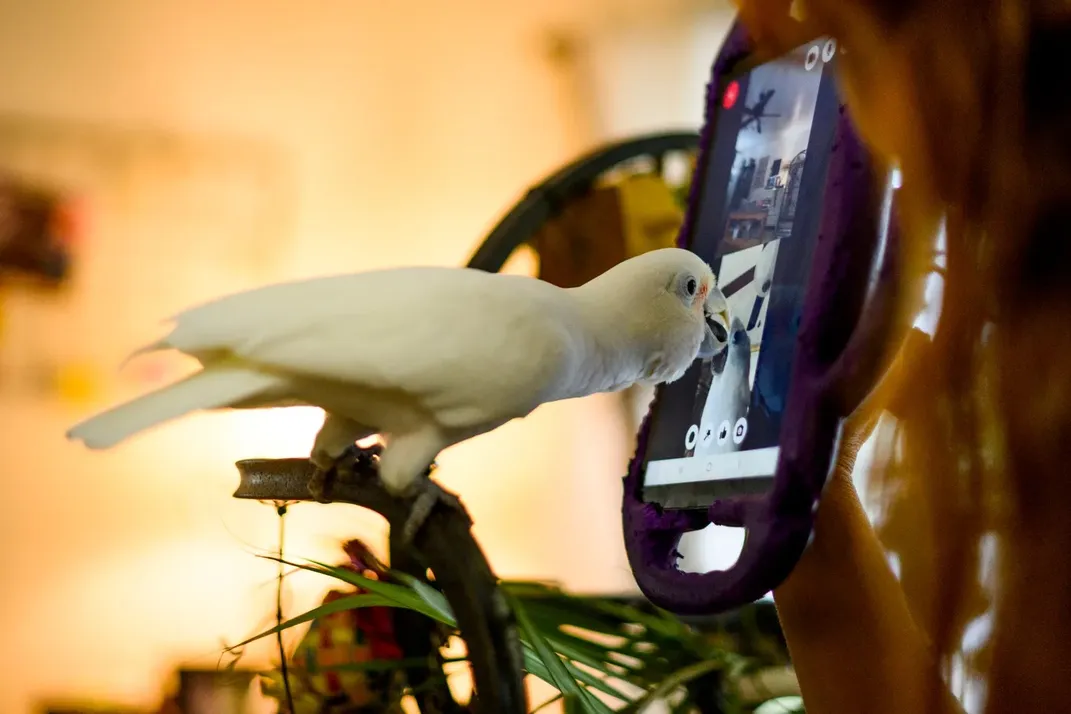Researchers Taught Lonely Parrots to Video Call Each Other; The Results Were Astonishing

(EnviroNews USA Headline News Desk) — It may sound a bit hard to believe, but scientists have now taught parrots how to communicate with each other via video calls. Researchers from Northeastern University, the University of Glasgow and Massachusetts Institute of Technology (MIT) made the breakthrough after seeking ways to stop the notoriously sociable and long-lived birds from getting lonely.
Not only were they able to teach the chatty birds how to initiate and participate in video calls, but they saw signs the parrots were benefiting from the experience by making new friends.
Study co-author Dr. Jennifer Cunha, from Northeastern University, told Glasgow University this:
The parrots seemed to grasp they were truly engaging with other birds onscreen and their behavior often mirrored what we would expect from real-life interactions. We saw birds learn to forage for the first time, and one caregiver reported their bird flew for the first time after making a call. All the participants in the study said they valued the experience, and would want to continue using the system with their parrots in the future.
Researchers chose several parrot species across multiple locations to take part in the trial, giving the pet owners careful instructions on how to support and protect their birds. After teaching them which buttons to press (or peck), they took careful notes on the birds’ behavior.
Amazingly, it soon became clear that many of the parrots were loving the experience, choosing their favorite feathered-friends from an on-screen menu and copying the sounds and movements of their new virtual pals.

The study, which is the first of its kind, observed more than 147 deliberate calls over 1,000 hours among 18 different parrots. It found the highly intelligent birds were displaying behaviors associated with fun and happiness.
Co-author Dr. Ilyena Hirskyj-Douglas from the University of Glasgow, told The Guardian newspaper this:
Some would sing, some would play around and go upside down, others would want to show another bird their toys. I was quite surprised at the range of different behaviors.
The scientists were quick to point out that calls were immediately terminated when birds showed even the slightest hint of distress or even boredom. Researchers reported to Smithsonian Magazine how video calls were cut short if their attention began to wander or if they became aggressive and started pecking at the screen. As the study’s authors noted in a statement: “Unmediated interactions could lead to fear or even violence and property damage.” In fact, Northeastern University’s Assistant Professor, Dr. Rébecca Kleinberger, told Northeastern Global News: “We were really careful about training the birds’ caregivers thoroughly to ensure that they could offer an appropriate level of support to empower their parrots but also help them avoid any negative experiences.”
However, in most cases the birds continued their calls and chatted peacefully until reaching the stipulated five-minute time cap. Not only were they keen on chatting for long periods, but the birds that initiated the highest number of outgoing video calls were also on the receiving end of the most incoming calls, suggesting a reciprocal dynamic, similar to human socialization. The team also compiled a highlight video featuring touching interactions between birds and their newly found cyber-friends.
But why did the researchers choose parrots over other intelligent birds, such as crows, raptors, or the brainiest of them all, the Eurasian magpie (Pica pica) – a bird so bright, it has even learned to outsmart scientists? Well, parrots are naturally sociable when in the wild, congregating in large flocks. Yet there are thought to be 20 million parrots living as pets in people’s homes across the USA — many of them without a parrot friend to pass the time. Their loneliness is compounded by their susceptibility to transmissible diseases, including the often deadly wasting illness, avian ganglioneuritis, which sees birds suffer from abnormal head movements, seizures and other neurological abnormalities. This makes many pet owners reluctant to take their pets to meet other parrots in person.
Yet sadly, isolation can cause them to develop similar psychological symptoms such as rocking, excessive pacing, or self-harming behaviors like feather-plucking. The team wanted to find out whether parrots could learn to make and receive video calls to help mitigate domestic isolation, and whether they would choose to do so once they understood the process. The answer appears to be a resounding yes. In fact, some owners reported how their pets displayed more affectionate, bonding behavior with them after the call had ended, suggesting the interaction had improved the parrots’ mood and made them feel more sociable.
“Video-calling technology helped a lot of people through the early days of the COVID pandemic where self-isolation was vital to slowing the spread of the virus,” Dr. Hirskyj-Douglas told US Today. “We wanted to know whether the same kind of experience would benefit the parrots.”
The international team was perfectly placed to carry out the work having already separately investigated whether technology could enrich the lives of animals in zoos and at home. That research included DogPhone, a study which allowed pet dogs to shake balls to video-call their owners, and JoyBranch, an interactive device designed to allow zoo animals to play music in their enclosures. They have also developed tablet interaction games and speechboard devices for parrots.
“The animal internet is already here – there are hundreds of products on the market that let pet owners interact with their animals remotely over the net, but their design is primarily focused on what humans want, not what their pets need,” Dr. Hirskyj-Douglas’ concluded in her statement.
The international team continues working together. Its future work will focus on “developing ethical frameworks” centering around the physical, mental and emotional requirements of animals rather than their human owners.
Birds that participated in the trial included six different species of macaw, three African grey parrots (Psittacus erithacus), two cockatiels (Nymphicus hollandicus), two parakeets (Myiopsitta monachus), a parrotlet (Forpus coelestis), a sun conure (Aratinga solstitialis), a black-headed parrot (Pionites melanocephalus), a Senegal parrot (Poicephalus senegalus) and a Goffin’s cockatoo (Cacatua goffiniana). Three of the parrots dropped out of the trial after showing zero interest in engaging with their peers via video-link.
The team’s paper, Birds of a Feather Video-Flock Together: Design and Evaluation of an Agency-Based Parrot-to-Parrot Video-Calling System for Interspecies Ethical Enrichment, is published in Proceedings of the 2023 CHI Conference on Human Factors in Computing Systems.
RELATED NEWS FROM ENVIRONEWS
Bird Snatching Bandits Kidnap African Grey Parrot to Near Extinction in Ghana – EnviroNews | The Environmental News Specialists
(EnviroNews World News) – African grey parrot numbers have plunged by 99% in the west African country of Ghana a new in-depth census has shown. The dreadful data indicates the species is now critically endangered in the country. With the estimated intellectual capacity of a 5-year-old child, no…
Breathtaking Video: Bet These Scarlet Macaws Can Bring a Tear To Your Eye – EnviroNews | The Environmental News Specialists
(EnviroNews World News) – When it comes to nature and wildlife videos, we’ve seen a lot of ’em here at EnviroNews, and we’re pretty picky too when it comes to pumping up videos from outside our own archives. We have a mountain of unreleased wildlife films on-hand as…
Ever Seen a Magpie Funeral? WATCH: ‘World’s Smartest Bird’ Perform ‘Ceremonial Rites’
Ever Seen a Magpie Funeral? WATCH: ‘World’s Smartest Bird’ Perform Ceremonial ‘Death Ritual’
‘World’s Smartest Bird’ Strikes Again: AU Magpies Remove Research Radio-Collars, Leaving Scientists Stunned – EnviroNews | The Environmental News Specialists
(EnviroNews World News) – A new study suggests Australian magpies (Gymnorhina tibicen) are willing to help other group members without receiving an immediate reward – an extremely rare trait in nature. Scientists at Australia’s University of the Sunshine Coast were hoping to observe magpie movements using tracking devices…
FILM AND ARTICLE CREDITS
- Dan Keel - Journalist, Author


![Leading the Charge for America’s Wild Horses on Capitol Hill: NBA/NFL Celeb. Bonnie-Jill Laflin: ‘[Politics] won’t stop us from fighting’](https://cf-images.us-east-1.prod.boltdns.net/v1/static/1927032138001/f46b2158-cead-47f0-ab44-4b027059411a/4e4afcf2-937d-4a9d-acba-1b82e2efd4c6/160x90/match/image.jpg)


